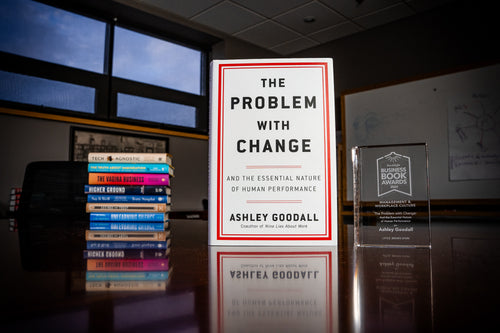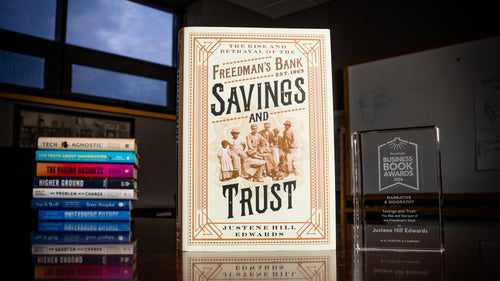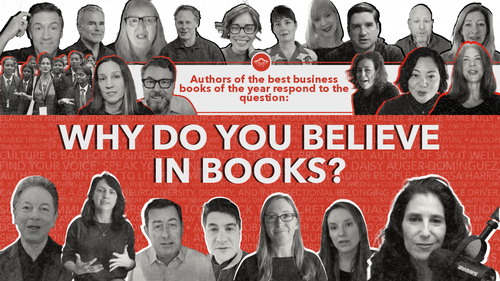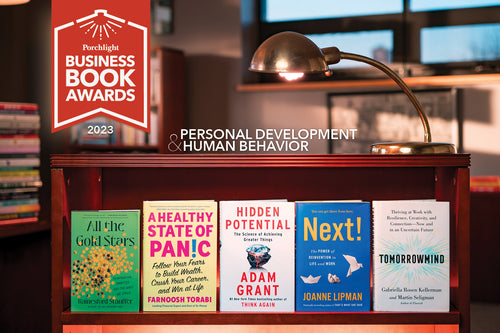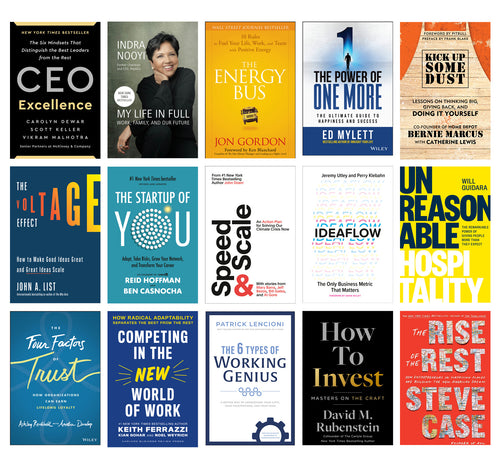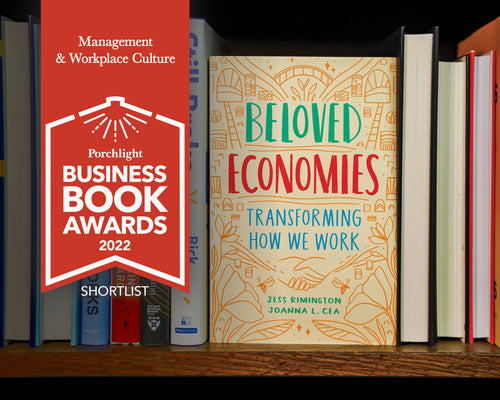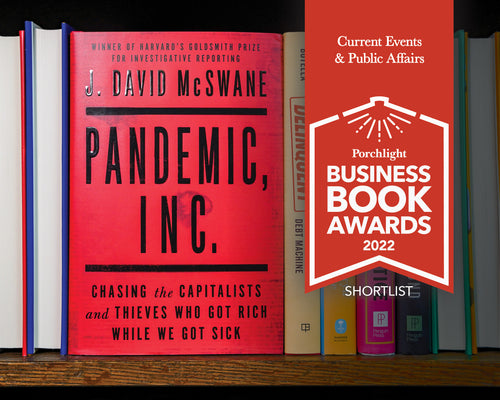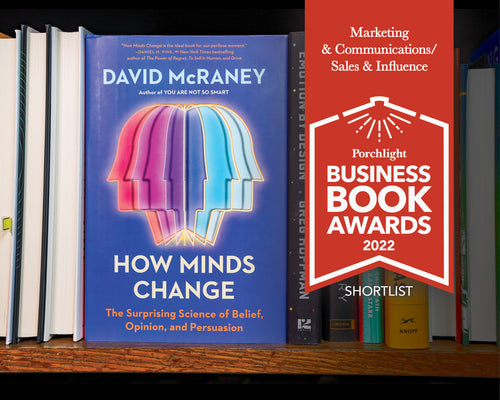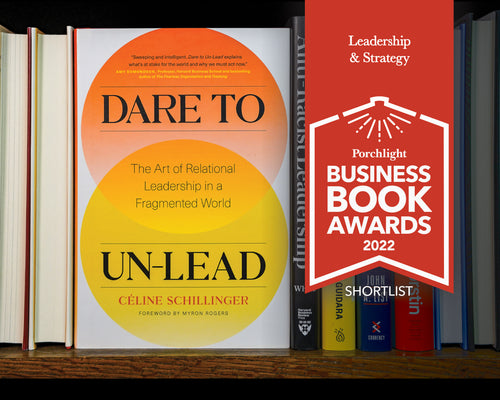The following excerpt is taken from Chapter 1 of The Integrity Dividend: Leading by the Power of Your Word by Tony Simons.
From the publisher: In The Integrity Dividend Tony Simons shows how leaders' personal integrity drives the profitability and overall success of their organization. This groundbreaking book is based in on solid research and reveals that businesses led by managers of higher integrity enjoy deeper employee commitment, lower turnover, superior customer service, and substantially higher profitability.

The following excerpt is taken from Chapter 1 of
The Integrity Dividend: Leading by the Power of Your Word by Tony Simons.
From the publisher:
In The Integrity Dividend Tony Simons shows how leaders' personal integrity drives the profitability and overall success of their organization. This groundbreaking book is based in on solid research and reveals that businesses led by managers of higher integrity enjoy deeper employee commitment, lower turnover, superior customer service, and substantially higher profitability. This improved performance is the integrity dividend.
Chapter 1: The Dollar Value of your Impeccable Word
Stan Myers, president and CEO of SEMI, a global semiconductor industry association, tells the following story about the impact of keeping his word. When he was CEO of Mitsubishi Silicon America, he planned to move his R&D department from the San Francisco Bay area to Salem, Oregon. Many employees were not interested in moving. As an incentive, he offered a retention bonus to people who would stay the full eight months until the move and help to recruit their replacements. If they took another job before the eight months, they would get severance, but would not get the retention bonus. One young engineer, Alan, got another job, did not get his retention bonus, and finance did not pay him his legitimate severance, which was several thousand dollars. He never asked for it. About a year later, Stan, the CEO, learned about the mistake. He had his people cut the check, found and visited Alan's new workplace, and asked the president of the company to bring Alan up to the conference room for a conversation.
Alan came in and he said, 'What are you doing here? I haven't seen you for a while,'
Stan said, 'Yes, Alan, but I wanted to tell you we forgot to pay you your severance.'
Alan was overwhelmed. More than 15 years later, Stan heard again from Alan. Alan had started up a successful company. He sought out Stan to present him with an engraved iPod Nano, thanking him for his leadership and friendship.
I draw two points from this story. One is that the simple act of keeping a promise can have a huge impact on a person. The second point is scarier:
Alan did not expect his employer to keep his word. The fact that Stan acted as he did struck Alan as extraordinarily unusual. CEOs are very busy. Nobody likes to admit a mistake. There probably would have been no fallout if the check had never been written. There would have been understandable reasons for Stan Myers not to have acted as he did. But the fact that he did says something about the man as a leader. And it helps to explain his great success in that role.
It's easy to break a promise. It's even easier to forget the price of breaking it. After all, who can measure that price? Few would deny that a broken promise lowers the morale of your employees, but what's the real dollar cost--the bottom line impact? Or what is the payoff of
keeping a promise? It should be simple to align your words and actions in a way that employees can see. But if it's so simple why do most employees say their managers do not do it? Maybe it is not so simple.
Consider how two executives described to me the benefit of an impeccable word--and the cost of lacking one:
Good leadership is, 'Whatever I say I'm going to do, I'm going to do.' That means I have to know what my limitations are and what I'm capable of delivering. As a leader if you don't fulfill your commitments, I can't think of anything that can hurt you more than that.
--Frank Guidara, President and CEO, Uno's Chicago Grill
If your staff see you cutting corners, then they're not going to take you seriously. And then they're not going to take the values that you're trying to instill seriously. Because you're not taking the values seriously.
--Deirdre Wallace, President, The Ambrose Group
Like these successful executives, you, too, most likely want be an honest and respected leader. But this book is about more than being respected. As its title says, it's about
The Integrity Dividend--and why and how keeping your word as a leader pays off on the bottom line. One thing that sets this book apart from others that discuss the importance of integrity is that it tells how I have been able to accurately measure its positive dollar impact. As you will see more in later chapters, successful executives I talk to recognize the dividend, too, but until now it has not been well measured.
I am not asking you to be motivated by any intrinsic payoff, though I think there are several. Integrity, for me, is about being more
effective, because people see you as consistently following through on your word and demonstrating the values you profess: more effective as a leader, because you more readily capture the
hearts of your followers; as a communicator, because people know you mean what you say; as a partner, because you can be counted on; as a customer because you complete business transactions more efficiently; as a supplier, because buyers can know what they will get; and as a brand, because you keep your promises--and promises are all that a brand is. Integrity contributes hugely to executive effectiveness.
Behavioral Integrity: A Recognized Fit Between Words and Actions
Most successful executives intuit the importance of a reputation for integrity. It plays a major role in our public discourse, as politicians of all stripes revel in accusing their opponents of lacking it. People sense its importance, perhaps especially now, as corruption scandals break careers, lives, bank accounts, and the faith of millions. But in 2005, "integrity" was the single most looked-up word on the Merriam Webster dictionary website, which implies that people are not exactly sure what integrity means. Think about that for a minute:
people know integrity is important but they are not sure what it means.
Often people use the word "integrity" to describe a general quality of acting ethically. Ethics are important, but they are not what this book is about. For the purposes of this book,
integrity means the fit between words and actions, as seen by others. It means promise-keeping and showing the values you profess. This book is simply about keeping your words lined up with your actions--keeping promises and living by the same values you talk about--seamlessly, as in the
integrity of hull of a boat. It means being seen as living by your word.
Behavioral integrity is not about the content of a person's values, though I believe that content is very important. It is about how well a person
follows through on the values he or she espouses. I can judge people despicable for what they value. But if they walk their talk and keep promises, I will--grudgingly--concede that they have behavioral integrity. A colleague of mine once proclaimed at a department meeting that his decisions would be guided strictly by self-interest, and that he had no concern for what the department or the school needed. I did not like working with the guy, nor did I trust him. But he was living up to his word, and I had to give him credit for behavioral integrity.
It is not enough to keep your word; others have to be aware that you are doing it. And here is where it gets sticky: Like beauty, behavioral integrity is in the eye of the beholder. Consistently keeping promises and living by your stated principles are, of themselves, difficult.
Being seen as consistently doing these things is a challenge worthy of the best of us. People we manage spend a lot of time watching us and trying to figure us out. They generally notice and understand more than we realize. But they also carry their own baggage, their own hurts, cynicisms, and biases, and their judgments about our integrity are colored by everything from their own parental issues from childhood to previous bosses to personality to the particular moments they happen to witness. As effective leaders--or business partners, suppliers, board members, whatever--our challenge is to penetrate the veil of others' subjective perceptual processes and convey integrity regardless of them.
That added step of managing others' perceptions makes the challenge more difficult than it might have seemed. It is not enough to manage your own level of consistency. You have to manage others'
perceptions of it, without lapsing into cynical manipulation, which probably would not work anyway.
Leadership, Trust, and the Integrity Dividend
It is difficult for anyone to define, measure, and develop leadership, in part because leadership involves trust, inspiration, challenge, strategic vision, and much else. But leadership is critical to just about any company's performance, and there are many books about it, many offering terrific insights. Still, I suggest that the basic insight of this book--a fundamental, challenging one with a demonstrated financial dividend, has not heretofore received the kind of attention it warrants.
Consider the issue of trust, about which there has been a recent flurry of leadership books. Most agree that trust is a critical ingredient for leadership, since few people will follow someone they do not trust. Most also agree that trust is complicated, involving reliance, emotion, and respect, and a sense that the trusted person will look out for you. This book will argue for looking particularly hard at reliance as a crucial ingredient for building and keeping trust. Reliance is the belief that a leader keeps his word; fulfills his promises; show the same values he professes. That is what "walking the talk"
really means. If people do not see this consistency, leadership
cannot happen,
at all. You cannot even get out of the starting gate as a leader if people do not believe your words. Behavioral integrity is a simple idea, though very hard to put into practice. But if you can do so, your powerful word pays off in powerful, concrete dividends.
Later chapters of this book will say how to capture the
integrity dividend. Before moving on to them, however, let's look at some of the growing evidence that the dividend really exists.
A Scientific Study: The Dollar Value of an Impeccable Word
A few years ago, a colleague of mine at Cornell University's Hotel School, Cathy Enz, was fascinated by the idea of clear corporate values as a powerful tool for enhancing effectiveness. At the time I had not yet latched onto the idea that how well a leader's actions lined up with his or her words would make a critical difference in that leader's effectiveness. Through many of our conversations, I kept coming back to the idea that
talking about values was one thing,
acting on them was another, and that
aligning those words and actions might be the most powerful combination by far. By that time I had also begun to regard as toxic the common exercise of drafting up a statement of values that sits in a few desk drawers. It gives rise, I thought, to cynical employees who see their bosses pretending to values they do not implement. And cynicism kills spirit, and so undermines the company's bottom line performance in a thousand small and large ways. But at that point my thoughts were just theory without clear supporting evidence.
Management scholars have generated significant recent research on several concepts related to word-action alignment. Trust is widely recognized and demonstrated as a key performance factor in teams and leadership in general. A study of NCAA college basketball teams found that players' trust in leadership drives the quality and consistency of team performance[i][ii]. Several studies have shown that trust in leadership drives subordinates' positive attitudes and their willingness to expend effort beyond formal job definitions[iii]. Fairness perceptions[iv] and perceived violations of "psychological contracts"[v] have also been shown, over many studies, to affect employee attitudes, discretionary effort, and retention. But with a very few exceptions, the previous relevant research had focused on
individual outcomes rather than
company-wide outcomes. No one had zeroed in on the idea of leaders living by their word, linking it to company performance as its final outcome.
I began to look for ways to test the bottom line impact of word-action alignment. Testing the bottom-line impact of anything in the real world is not especially easy. To test a single factor like integrity, you need a lot of businesses that you can compare directly to each other. Franchises make a good testing ground, as you can filter out a lot of variation, comparing the performance of independent business units that are very similar in most ways but have different managers who lead with different styles.
I found help in this investigation from Pete Kline, then the CEO of Bristol Hotels and Resorts. Bristol Hotels and Resorts operated over 110 hotels in the US and Canada, including Holiday Inn franchises. Pete is a brave man who also intuited the truth of the claim I wanted to test. We focused on 76 Holiday Inn hotels that were in the US and not unionized. Bristol agreed to share the financial performance, employee turnover, and guest satisfaction information for each hotel. Bristol asked me to design its employee survey to include penetrating questions about how much people trust their bosses and how good they think that boss' word is.
For the project, I collaborated with Professor Judi McLean Parks of Washington University, an expert at measuring employee perceptions of their implicit and explicit employment deals – what she calls the "psychological contract." By applying solid scientific practice (focus groups, careful pre-testing, pre-validated questions where feasible, multiple questions "triangulating" on each underlying idea, and objective operational performance measurement), we created a survey that could measure a chain of impact running from behavioral integrity perceptions to attitudes to behaviors to the bottom line.
At a few hotels we ran focus groups about what behavioral integrity looked like, and pilot-tested the survey, translated into five different languages. Then we asked employees at all 76 hotels to complete the survey. They did so anonymously, on company time, with a raffle for sweatshirts and dinners out as an incentive. Most employees filled out paper surveys, but we set up "read-aloud" tables for the roughly 7% of employees with limited literacy[vi]. At each hotel, we asked line employees, supervisors, department managers, and the general manager to say how strongly they agreed or disagreed with statements like:
- My manager practices what he/she preaches.
- When my manager promises something, I can be certain that it will happen.
- I would be willing to let my manager have complete control over my future in this company.
The first two questions regard behavioral integrity, and the third regards trust. The questions are phrased as extremes, so that a statement of strong agreement indicates a deep belief in integrity, or a deep feeling of trust. I did not want to ask questions with which it would be easy to agree.
Each hotel employed around one hundred and thirty employees spread over six to eight departments. Typically the biggest departments by far were housekeeping and front office. Around two-thirds of all employees (more than sixty-five hundred) completed our surveys. For every manager with four or more employees, we generated feedback reports that described employees' relationships with that manager. For each hotel we collected employee turnover information, the results of independently conducted customer satisfaction surveys, and financial performance information for the months following the employee survey.
We averaged employee perceptions at each hotel, and applied path analysis (more on that below) to evaluate all the links in a chain of impact at the same time. We expected to find a chain that runs from employee perceptions of their managers' behavioral integrity, to employee trust in their managers, to their commitment to the company, which would in turn drive both employee turnover and discretionary service behavior. Discretionary service behavior should drive customer satisfaction, and profit should be affected by both employee turnover and customer satisfaction.
The results of the study were so clear that they surprised even me. As Figure 1.1 shows, the average employee perception of how much the employee's manager kept promises and lived by stated values drove hotel profitability more strongly than the five other attitudes measured by the survey.
Figure 1.1. Strength of Association Between Business Profitability and Different Employee Attitudes (please see book for graphic)
Let's take a minute with that result alone: How strong your employees feel their managers' word is--their assessment of their managers' behavioral integrity--is more important to your company's financial performance than employee trust, sense of fairness, commitment, or satisfaction. These other attitudes also matter, to be sure. But behavioral integrity came out as the single most powerful driver of profit. It might be more important that the workers know you mean what you say than whether they like you or the company or their work. First comes the word. Everything else follows.
The survey had asked employees to respond to statements with a number from 1 ("strongly disagree") to 5 ("strongly agree"). Results showed that one-eighth of a point difference in the average employee behavioral integrity ratings between two hotels on this scale pointed to a difference in profits of around two and a half percent of revenues; the eighth-point difference raised the portion of each dollar of revenue that the company got to keep as profit by two-and-a-half cents. Typical revenue streams for that size and tier of hotel run around $10 million annually,
so that difference in behavioral integrity raised profit by an average $250,000 per hotel per year. Many of the hotels with high management integrity converted over ten cents more of each revenue dollar into profits than others. Does behavioral integrity make a difference to the bottom line? The evidence said emphatically--hugely--yes. We had detected the
integrity dividend.
Here are the details of the chain of impact that we saw:
- Where employees feel their managers keep promises and live by the values they describe, they trust their managers more.
- Where they trust their managers more, they become more emotionally committed to the company--caring more deeply about its mission and taking pride in working for it.
- Where they feel greater emotional commitment to the company, they are more willing to stay in their jobs, and to go beyond their formal job descriptions by providing discretionary service to satisfy guest requests.
- Guests who experience discretionary service from hotel employees like it and feel more satisfied.
- Satisfied guests translate to repeat business, which boosts profits. Employee retention boosts profits as well.
Here is a simpler way to describe the chain: Where employees reported high integrity on the part of their managers, we saw:
- Deeper employee commitment, leading to
- Lower employee turnover and
- Superior customer service; all leading to
- Higher profitability.
This study took place in a single industry--the hotel business. Is there evidence of a similar bottom-line integrity dividend in other industries? After all, the hotel business is unique in some ways. It is a service industry that sells positive guest experiences. The pivotal role of customer contact in determining the quality of the final product suggests that employees' emotional response to their work might be more important for hotels than for, say, a manufacturing business. Hotels also employ a less educated labor force than most white-collar businesses. However, there is no evidence that sensitivity or response to managers' integrity issues depends on education level.
As a framework for systematic studies, the notion of behavioral integrity is new--even if the essential idea has long been discussed as an element of good leadership. Other scholars have already started to build on this initial work, and are creating a research community, with sessions devoted to the topic at annual Academy of Management conferences. In coming years I expect to see similar research results in other industries, as more scholars explore the causes, consequences, and management of the issue. Apart from that future research there is already strong evidence that the behavioral integrity effect holds true in other industries as well. For one thing, the attitudes and behaviors that are driven by behavioral integrity (trust, perceived fairness, employee commitment, turnover, and discretionary effort) are already well demonstrated performance drivers in a variety of both service and manufacturing industries[vii]. Further, all the executives I spoke with--in a wide variety of industries--agreed that behavioral integrity plays a pivotal role in determining attitudes toward leadership and ultimately in driving performance. Chapter 2 will begin to discuss what the integrity dividend looks like in other industries.
The Integrity Dividend in Practice: Checking with Executives
Braced by my evidence that managers' promise-keeping and living by stated values drives profitability, I interviewed about a hundred successful executives to learn more about how behavioral integrity works. I spoke with leaders in high-tech manufacturing, health care, real estate, restaurants, hotels, food service, and non-profit, as well as union leaders, and a handful of executive coaches and consultants. My primary criterion for selection was that the executives be successful in their chosen fields, as shown by a pattern of promotions and executive positions. I sought to understand the payoffs and the challenges around behavioral integrity through their eyes, figuring that most successful managers have something to teach me and others working on this issue.
I conducted hour-long interviews, usually by telephone. The result was over 2,000 pages of transcription, which I and my research team broke down into discussion themes. We looked for patterns, extracted and developed stories that related to those patterns, and massaged the pooled insights of these many executives to yield the book you are reading.
I asked the executives about how they perceive the challenges and consequences of word-action alignment or its lack. I also asked them for both general and specific advice. Their responses are valuable in two main ways. First, as I noted above, they demonstrate that the integrity dividend is not unique to the hotel industry. Second, they flesh out the whys and hows of behavioral integrity in deeper, more practical detail. The techniques the executives propose are research-grounded in the sense that they drive the kind of integrity perceptions that create the dividend shown in the Holiday Inn research. However, it is also true that the process of talking to these executives and drawing out and combining their insights may resemble art more than it resembles science. I am learning about integrity along the way. I expect that you will, too.
The interviews yielded four main themes, which we will explore in coming chapters:
- The payoff of behavioral integrity is greater personal and organizational effectiveness --it builds personal credibility and trust, which enhance your ability to get things done through people.
- Employees who trust their leaders work harder and with clearer direction. Trust also leads to greater efficiency in customer relationships, supplier relationships, and union relationships.
- Some of the hardest things to manage about behavioral integrity come down to recognizing and reckoning with our own personal habits and the ways we have learned to interact with people. Some of our well-intended actions serve to undermine our integrity and thus our credibility. Elements of self-knowledge and self-control are thus integral managing behavioral integrity. You have to be willing to occasionally sacrifice in the service of keeping your word. To create a word as good as gold, you sometimes have to demonstrate the value of your word by paying for it.
- Executives can extend behavioral integrity and its dividends through leaders and practices throughout the organization. It is not just about personal relationships. Through careful modeling, training, coaching, accountability and incentives, impeccable follow-through can become a mutual expectation that forms part of the structure and the culture of the company. Make it a shared priority and watch your effectiveness build.
Challenges Rather Than Easy Answers
You may be thinking that behavioral integrity cannot be easy. It isn't. It is hard work, accepting one's word as one's absolute bond and making that bond as solid as steel. The payoff, of course, is that your word of steel is as valuable as gold, because great integrity is rare and people are drawn to it. The challenge is especially great for people who take on the job of managing others in a company hierarchy. Most managers' days are filled with brief tasks, noise, and fires that need putting out. It isn't easy to keep track of commitments. Sometimes your boss countermands your decisions--at the cost of your own credibility. Sometimes the need to keep relationships smooth leads you to sugar-coat the truth, and sometimes that sugar coating leads others to feel betrayed if they mistook the frosting for the cake.
Managing behavioral integrity demands very careful communication as described in Chapter 5. People misunderstand each other all the time--and they feel no less betrayed when the promise that was broken was wrongly understood. And people so often ignore the escape clauses we insert into our promises, such as "I'll try" or "I hope" or even "probably." People often hear the message they hope to hear, or the message they expect. People bring their own cynicism and other kinds of baggage to interactions, and they will sometimes assume you are lying before you speak.
Your position within the company sometimes adds other challenges to living by your word. Leaders are sometimes expected to project confidence and certainty even when they lack it. Managers are sometimes asked to produce short-term results at any cost, or to publicly endorse policies with which they do not agree. As subordinates, leaders and managers sometimes face bosses who prefer deference over honesty. As negotiators, they often fear that truthfulness sacrifices a competitive edge.
When companies face change, the challenges become greater still. Policy shifts are often confusing, and sometimes, as a manager, you have to introduce changes that violate values you yourself promoted. Sometimes in your ambivalence you send mixed messages. And sometimes the policies themselves seem to contradict each other in the values they imply. Then there are initiatives about which you may not be allowed to speak, like layoffs, acquisitions, and mergers.
These challenges are often attended by other difficulties you must face, including tradeoffs, the need to forsake expedient solutions, hard conversations you must have, and personal weaknesses you (like all of us) must acknowledge and confront. The executives and coaches I interviewed for this book have faced them, too, and sometimes they made mistakes. But more often they overcame them--and collected the integrity dividend.
I cannot say with certainty that integrity will always yield the practical outcomes you want. But I can say that its lack, over time, kills spirit among those who follow, and that excellent leadership is fundamentally about building and focusing spirit toward extraordinary achievement.
As a leader, you should finish this book a little wiser, a little more insightful, and a little more effective. It is not about how you can feel better about yourself or how you can better live up to your moral values or those of society. It is about creating more effective relationships and more effective businesses through alignment. Develop a powerful word, because it will serve you well.
Summary
This book is about building an impeccable word in order to increase your effectiveness and that of the people around you. Behavioral integrity is about having that impeccable, powerful word. It is about keeping promises, showing the values you profess, and being seen as doing so. It is not at all easy, especially as the goal is to do so
all the time.
Make no mistake: Others evaluate your integrity constantly. And the challenge is harder still when you consider the subjective biases they bring to that evaluation.
Behavioral integrity is not the whole challenge of leadership--there are many other skills and abilities involved in leading. It is not even the whole challenge of building and maintaining trust; there is more involved in that, too. But neither trust nor leadership happens without behavioral integrity, without certainty that the leader means what she says. Behavioral integrity is, in the language of logic, a necessary but not sufficient condition for trust or leadership. It is a cornerstone upon which trust and leadership must be based.
A careful scientific study tracked the consequences of behavioral integrity and measured the dollar impact of it as it operated through hotel worker attitudes and actions, affecting service delivery and the bottom line. The study suggested that employees' sense of their boss' strong behavioral integrity might be a more important performance driver than employee satisfaction, commitment, sense of trust, or feelings of fairness.
Extensive conversations with executives have confirmed both the impact and the challenge of behavioral integrity, and have provided ideas about how others have met the challenge. This book is aimed at helping you to master that challenge and so to reap the integrity dividend.
As mentioned earlier, Chapter two explores the integrity dividend in a variety of industries. Chapter three deepens our model of behavioral integrity's drivers and payoffs. Chapters four through six explore common challenges to managers' behavioral integrity and how to address them. Chapters seven through nine focus on developing behavioral integrity at the company level. Chapter ten briefly applies the same framework to relationships outside the company.
Each chapter ends with brief points designed to help you apply these ideas to your workplace. The first three chapters have a set of questions labeled "consider." Later chapters add a section with specific tools and techniques, labeled "act."
Into Practice
Consider:
- Where have you seen high or low behavioral integrity on the part of your current or a previous leader or boss? How did it affect your work attitude? Your level of discretionary effort? Your peers?
- How high a priority is keeping your word? How much would you sacrifice in order to keep your word?
- Where do you find it challenging to keep promises or live up to stated values? How much does the resulting gap cost you?
Tony Simons, author of
THE INTEGRITY DIVIDEND, is an Associate Professor at Cornell University where he teaches organizational behavior, negotiation, and leadership. He is also a business consultant and speaker who focuses on trust in leaders, executive team member trust, and trust in supply chain relationships. He received his B.A. from the University of Chicago and his masters degree and doctorate from Northwestern University.
For more information, please visit
www.integritydividend.com.
 The following excerpt is taken from Chapter 1 of The Integrity Dividend: Leading by the Power of Your Word by Tony Simons.
From the publisher: In The Integrity Dividend Tony Simons shows how leaders' personal integrity drives the profitability and overall success of their organization. This groundbreaking book is based in on solid research and reveals that businesses led by managers of higher integrity enjoy deeper employee commitment, lower turnover, superior customer service, and substantially higher profitability. This improved performance is the integrity dividend.
Chapter 1: The Dollar Value of your Impeccable Word
Stan Myers, president and CEO of SEMI, a global semiconductor industry association, tells the following story about the impact of keeping his word. When he was CEO of Mitsubishi Silicon America, he planned to move his R&D department from the San Francisco Bay area to Salem, Oregon. Many employees were not interested in moving. As an incentive, he offered a retention bonus to people who would stay the full eight months until the move and help to recruit their replacements. If they took another job before the eight months, they would get severance, but would not get the retention bonus. One young engineer, Alan, got another job, did not get his retention bonus, and finance did not pay him his legitimate severance, which was several thousand dollars. He never asked for it. About a year later, Stan, the CEO, learned about the mistake. He had his people cut the check, found and visited Alan's new workplace, and asked the president of the company to bring Alan up to the conference room for a conversation.
Alan came in and he said, 'What are you doing here? I haven't seen you for a while,'
Stan said, 'Yes, Alan, but I wanted to tell you we forgot to pay you your severance.'
Alan was overwhelmed. More than 15 years later, Stan heard again from Alan. Alan had started up a successful company. He sought out Stan to present him with an engraved iPod Nano, thanking him for his leadership and friendship.
I draw two points from this story. One is that the simple act of keeping a promise can have a huge impact on a person. The second point is scarier: Alan did not expect his employer to keep his word. The fact that Stan acted as he did struck Alan as extraordinarily unusual. CEOs are very busy. Nobody likes to admit a mistake. There probably would have been no fallout if the check had never been written. There would have been understandable reasons for Stan Myers not to have acted as he did. But the fact that he did says something about the man as a leader. And it helps to explain his great success in that role.
It's easy to break a promise. It's even easier to forget the price of breaking it. After all, who can measure that price? Few would deny that a broken promise lowers the morale of your employees, but what's the real dollar cost--the bottom line impact? Or what is the payoff of keeping a promise? It should be simple to align your words and actions in a way that employees can see. But if it's so simple why do most employees say their managers do not do it? Maybe it is not so simple.
Consider how two executives described to me the benefit of an impeccable word--and the cost of lacking one:
The following excerpt is taken from Chapter 1 of The Integrity Dividend: Leading by the Power of Your Word by Tony Simons.
From the publisher: In The Integrity Dividend Tony Simons shows how leaders' personal integrity drives the profitability and overall success of their organization. This groundbreaking book is based in on solid research and reveals that businesses led by managers of higher integrity enjoy deeper employee commitment, lower turnover, superior customer service, and substantially higher profitability. This improved performance is the integrity dividend.
Chapter 1: The Dollar Value of your Impeccable Word
Stan Myers, president and CEO of SEMI, a global semiconductor industry association, tells the following story about the impact of keeping his word. When he was CEO of Mitsubishi Silicon America, he planned to move his R&D department from the San Francisco Bay area to Salem, Oregon. Many employees were not interested in moving. As an incentive, he offered a retention bonus to people who would stay the full eight months until the move and help to recruit their replacements. If they took another job before the eight months, they would get severance, but would not get the retention bonus. One young engineer, Alan, got another job, did not get his retention bonus, and finance did not pay him his legitimate severance, which was several thousand dollars. He never asked for it. About a year later, Stan, the CEO, learned about the mistake. He had his people cut the check, found and visited Alan's new workplace, and asked the president of the company to bring Alan up to the conference room for a conversation.
Alan came in and he said, 'What are you doing here? I haven't seen you for a while,'
Stan said, 'Yes, Alan, but I wanted to tell you we forgot to pay you your severance.'
Alan was overwhelmed. More than 15 years later, Stan heard again from Alan. Alan had started up a successful company. He sought out Stan to present him with an engraved iPod Nano, thanking him for his leadership and friendship.
I draw two points from this story. One is that the simple act of keeping a promise can have a huge impact on a person. The second point is scarier: Alan did not expect his employer to keep his word. The fact that Stan acted as he did struck Alan as extraordinarily unusual. CEOs are very busy. Nobody likes to admit a mistake. There probably would have been no fallout if the check had never been written. There would have been understandable reasons for Stan Myers not to have acted as he did. But the fact that he did says something about the man as a leader. And it helps to explain his great success in that role.
It's easy to break a promise. It's even easier to forget the price of breaking it. After all, who can measure that price? Few would deny that a broken promise lowers the morale of your employees, but what's the real dollar cost--the bottom line impact? Or what is the payoff of keeping a promise? It should be simple to align your words and actions in a way that employees can see. But if it's so simple why do most employees say their managers do not do it? Maybe it is not so simple.
Consider how two executives described to me the benefit of an impeccable word--and the cost of lacking one:





